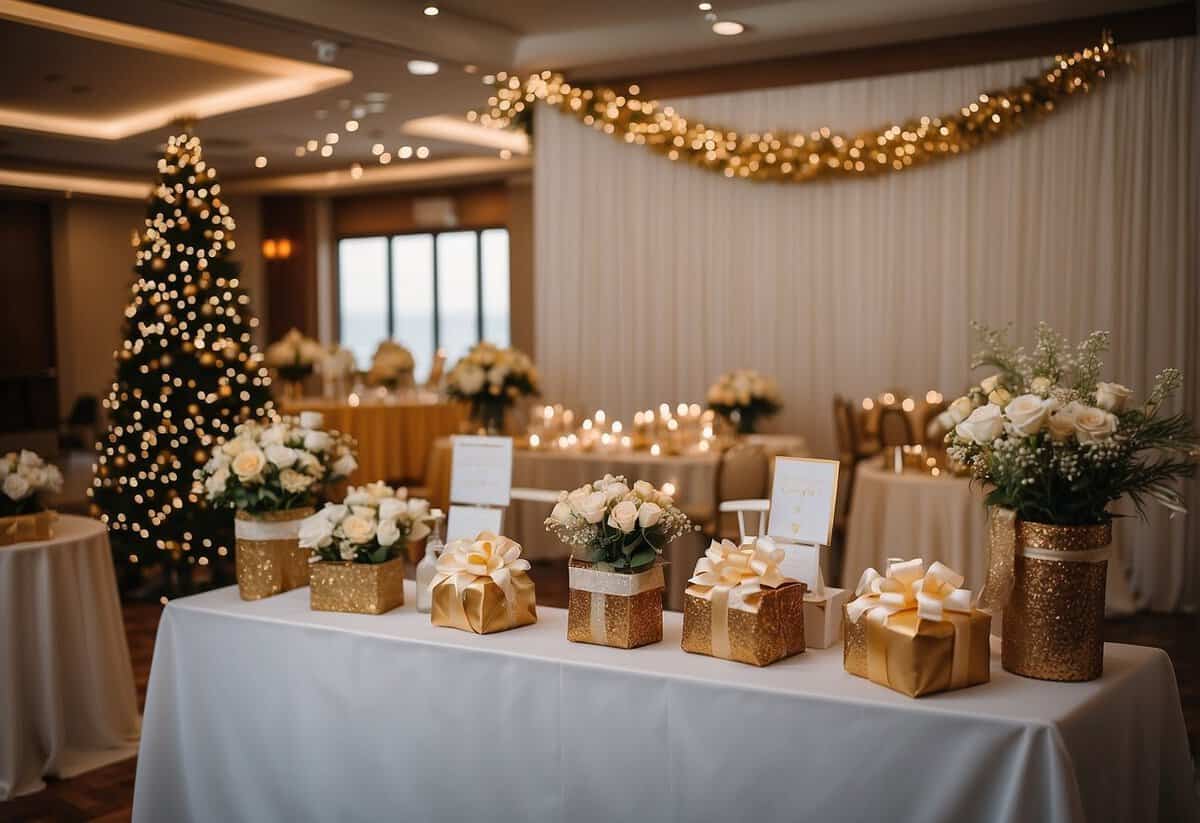What Percentage of Wedding Guests Don’t Give a Gift? Unwrapping the Statistics
Wedding gift-giving is often seen as a heartfelt tradition to celebrate the union of two individuals. It’s customary for guests to present the newlyweds with a gift, symbolizing their support and well-wishes for the couple’s new life together. However, not all wedding guests provide a gift, which may leave couples wondering about the norms and expectations of this practice. The percentage of guests who don’t give a gift can vary, and there are multiple reasons behind this choice.

Understanding why some guests may choose not to give a gift is essential for managing expectations. Factors can range from financial constraints to cultural differences, or simply a misunderstanding of wedding gift etiquette. It’s not unusual for a couple to face the awkward situation of not receiving a gift from a guest. Recognizing the varied circumstances that influence gift-giving can help in navigating these situations with grace and appreciation for the guests’ presence on the special day.
Key Takeaways
- Wedding gift-giving is a common tradition, but not all guests participate.
- Various factors, including finances and cultural norms, impact guests’ decisions.
- Navigating the absence of a gift can be done graciously and respectfully.
Understanding Wedding Gift Etiquette

Navigating wedding gift etiquette can often be confusing, as traditions and expectations vary by culture and region. It is crucial for you to understand whether giving a gift is mandatory or optional, how to adapt to cultural differences, and the proper way to handle gift registries and cash gifts.
Mandatory or Optional?
Wedding gift etiquette is largely influenced by social norms and personal relationships. Generally, it is considered polite for guests to offer a gift to the couple. However, whether this practice is seen as obligatory or merely a kind gesture can depend on the type of wedding and your closeness to the couple. For instances where you might not be able to afford a gift, considerable thought or a handmade present can also be meaningful.
Cultural and Regional Variations
Etiquette varies significantly across different cultures and regions. In some cultures, giving cash gifts is the norm, while in others, physical gifts are more traditional. Understanding the cultural background of the wedding can guide you on the most appropriate gift. For instance, some Eastern cultures prefer cash in red envelopes, while Western weddings may lean towards items listed on a wedding registry.
Gift Registry and Cash Gifts
Modern couples often set up a wedding registry that serves as a helpful guide for guests to pick gifts they know the couple would appreciate. Always consult the registry if one is available, as it can simplify your decision-making process. When it comes to cash, it’s becoming more acceptable, especially if requested by the couple. If providing a cash gift, it is respectful to do so discreetly. Remember to use your personal budget as a guide to give what you can reasonably afford.
Factors Influencing Gift-Giving

When considering whether to give a gift at a wedding, guests often weigh several aspects. Your relationship with the couple and budget play a significant role, as do the associated expenses of attending the wedding itself and your own financial constraints.
Relationship and Budget
Your relationship with the couple can greatly influence your decision on gift-giving. If they’re close family members or friends, you might feel inclined to offer a more substantial gift as a sign of your support and affection. On the other hand, a more distant relationship, such as a colleague or a casual acquaintance, might align with a smaller gift that fits your budget.
Wedding Expenses and Guest’s Financial Constraints
The cost of attending a wedding can add up quickly. Travel, accommodation, attire, and maybe even days off work translate into considerable expenses for you as a guest. These financial constraints can impact what you feel is feasible in terms of a wedding gift. Personal circumstances vary greatly, and it’s essential to balance celebration with your own fiscal reality.
The Impact of Not Receiving a Wedding Gift

When you attend a wedding, your presence contributes to the joy of the occasion. However, when a wedding gift isn’t given, it can stir mixed feelings for both guests and newlyweds.
Guests’ Perspectives
You might wonder about the significance of your presence versus the tradition of giving a gift. Some guests feel a sense of relief knowing that their joyful presence at the wedding is a form of support. However, others may experience guilt or embarrassment if they do not provide a gift, worrying that their gratitude for the invitation and the chance to celebrate love isn’t fully expressed. It’s common to have an internal debate on whether to send a thank you card for the invitation when a gift hasn’t been given.
Newlyweds’ Reactions
For the newlyweds, the lack of a gift from some guests might initially seem disappointing. There’s an expectation that each invitation may be reciprocated with a gift or token of gratitude. Yet, many couples understand that each guest has different circumstances and they’re often just as grateful for the presence of loved ones. In response to not receiving a gift, a thoughtful approach is sending a thank you note, acknowledging guests for celebrating love and companionship on their special day. This gesture of empathy can maintain the spirit of their union and keep the focus on the shared happiness rather than the material aspects.
How to Handle Gift-Giving Situations

Navigating the realm of wedding gift etiquette can be tricky—whether you’re a guest wondering how much to spend, or newlyweds grappling with an empty gift table. Here, we break down the dos and don’ts for each side to ensure a faux pas-free celebration.
When You Are the Guest
Attending a wedding often includes the traditional gesture of offering a gift. Two main factors should guide your decision: your relationship to the couple and your budget. If the couple is close to you, or if you’re part of the bridal party, you might consider spending a little more. However, there’s no need to stretch your finances for an expensive gift; thoughtful gifts or a group gift from several guests are always well-received. It’s essential to respect your limits and give what you can afford—avoid the oversight of matching the open bar tab with the price of your gift.
- Budget-Friendly: A heartfelt card with a check or gift card within your budget.
- Group Gifting: Join forces with other guests to purchase a more expensive item on the registry.
Remember, if you’ve also attended a bridal shower, you’ve likely already given a gift, and it’s okay if your wedding gift is less extravagant as a result.
When You Are the Newlywed
After your special day, you may notice some guests didn’t leave a physical gift or check. It’s estimated a small percentage will forget, but it’s also possible they’ve sent their gift directly to your home. If you suspect an oversight, the best way to handle such circumstances is with graciousness. Send a thank you note expressing your joy for their presence; not every guest will be able to give a gift, and that’s okay.
- Acknowledgment: Send a thank you card to all your guests, regardless of whether they gave a gift.
- Let It Go: If a colleague or a rando didn’t bring a gift, it’s often best to simply appreciate their company and move on.
The bottom line for both guests and newlyweds is to manage expectations and remember the true essence of the event—celebrating love and togetherness.
Frequently Asked Questions

Thank-you notes and gift-giving etiquette may be tricky to navigate, especially when it comes to weddings. Below are some commonly asked questions to help you handle these situations with grace and consideration.
How should I handle thank-you notes for guests who didn’t bring a wedding gift?
Even if a guest didn’t bring a gift, it’s courteous to send a thank-you note, acknowledging their presence at your wedding. Expressing gratitude for their time and company is always appreciated.
As a bridesmaid, am I obligated to give a wedding gift?
Being a bridesmaid often entails other expenses, so while giving a gift is a nice gesture, it’s not an obligation. Focus on supporting the couple in other ways, like your time and effort throughout the wedding events.
What is the etiquette if a wedding guest decides not to bring a gift?
The general etiquette suggests that you should not confront a guest about not bringing a gift. Your relationship with the guest is more important than any material offering.
Is it becoming more common for wedding guests to not give gifts?
Certain studies and articles touch on shifts in wedding guest behavior, which suggest variations in gift-giving trends. However, many guests still choose to give something, be it a physical gift or cash.
What are some thoughtful alternatives to giving a wedding gift if unable to do so?
If funds are tight, consider handmade gifts or creative services; offering to help with the wedding plans or a heartfelt letter can also be very meaningful to the couple.
How can you graciously acknowledge wedding guests who didn’t provide gifts?
It’s important to show appreciation for all guests, regardless of whether they brought a gift. A personal message or a note thanking them for joining and celebrating your special day is a generous way to acknowledge their presence.





